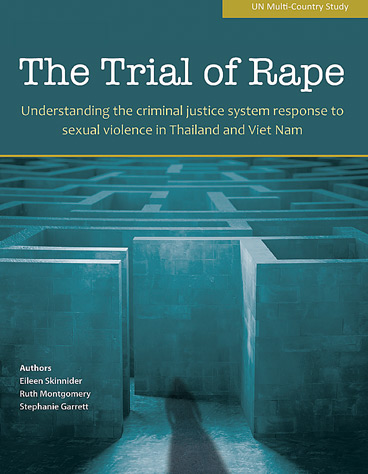
THE TRIAL OF RAPE: Understanding the criminal justice system response to sexual violence in Thailand and Viet Nam

This study, the first of its kind in the Asia-Pacific region, seeks to analyze how the varying criminal justice systems in Thailand and Viet Nam respond to reported cases of rape and sexual assault, and to identify the key institutional factors associated with the disposition of cases in these countries. In doing so, the study aims to understand where and how attrition of sexual violence cases occurs and identify strategic entry points for strengthening the administration of justice in this area.
The research incorporated the mapping of the sexual violence legislation and legal processes in each country, a quantitative review of a minimum of 120 police and/or court case files in both countries, and qualitative interviews and focus group discussions conducted by national research teams with a total of 213 key informants, including government officials, criminal justice system actors, civil society groups, and individuals providing medical forensic and support services.
The study finds, consistent with other global attrition studies, that cases can filter out at every stage of the justice process. There are four major points of attrition; 1) Initial reporting stage; 2) Investigative stage; 3) Pre-trial stage; and 4) Trial stage.
To address the challenges and to strengthen the criminal justice sector response to sexual violence, the study has identified priority recommendations in the following key areas:
- Establishing quality essential justice services for victims that prioritize their safety, protection and support.
- Building institutional capacities to transform organizational cultures and create gender awareness and sensitivity.
- Promoting comprehensive legal and policy frameworks.
- Ensure approaches sensitive to sexual violence survivors are reflected in criminal justice policies, practices and resources.
- Developing effective internal and external oversight and accountability mechanisms.
- Promoting specialized expertise at all stages of the criminal justice system.
- Promoting an integrated and coordinated criminal justice, government and civil society response.
- Developing effective monitoring and evaluation mechanisms.
- Prioritizing resources, both human and financial, for effective delivery of services.
XÉT XỬ TỘI HIẾP DÂM - Hiểu cách ứng phó của hệ thống tư pháp hình sự đối với bạo lực tình dục ở Thái Lan và Việt Nam
Đây là nghiên cứu đầu tiên về vấn đề này ở khu vực Châu Á – Thái Bình Dương, phân tích các hệ thống tư pháp hình sự ở Thái Lan và Việt Nam ứng phó như thế nào với các vụ việc bị hiếp dâm và tấn công tình dục được trình báo, đồng thời xác định các yếu tố chủ chốt về thể chế liên quan đến việc xử lý các vụ việc ở hai nước. Nghiên cứu này được thực hiện để hiểu rõ thực trạng bỏ cuộc của vụ việc bạo lực tình dục diễn ra ở đâu, và diễn ra như thế nào, đồng thời xác định xuất phát điểm chiến lược nhằm tăng quản lý hành chính tư pháp trong lĩnh vực này.